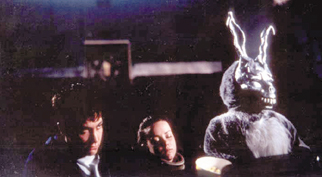Darko at the Edge of Town

The only date chaperone worse than your parents.
With the current trend of Hollywood shamelessly rehashing 80s teen movies reaching a peak, it seems only fair that at least one film might actually take this tiresome trend of appropriation and make it interesting. First-time film maker Richard Kelly has done just this with the sci-fi suburban noir Donnie Darko, a wildly ambitious rookie effort that combines the seemingly incongruous worlds of two of Kelly's obvious heroes: David Lynch and John Hughes.
The story revolves around Donnie (Jake Gyllenhaal), a schizophrenic teenager whose troubled visions are delivered via a six-foot tall rabbit that looks like the only survivor of a fire on the set of The Dark Crystal. These menacing visions possess Donnie to engage in increasingly bizarre pranks that quickly gain the attention of his annoyingly peachy 80s suburban town. Donnie's true condition becomes complicated, however, by an enigmatic event which occurs early on. Late one night while one of Donnie's visions have lured him out of the house, a jet-engine falls from the sky directly onto his house (and, more specifically, his room). As both a federal investigation and media frenzy erupt, it is discovered that the plane to which the engine belongs cannot be found. Moreover, there are no planes unaccounted for. As Donnie's condition worsens, he begins to search for connections between his visions and this mysterious accident (which would have taken his life under normal circumstances). What ensues is a labyrinthine adventure that may or may not involve murder, time-travel, and a protagonist whose perceived schizophrenia is actually an insight into the futureor the past. It depends on how you look at it.
Needless to say, this is where the David Lynch influence makes itself known. As the true complexities of the plot begin to unfold, elements of the film, which early on were assumed to be concrete, begin to seem less trustworthy. And while the blurred distinctions between reality and illusion are ultimately less poignant than a film like Lynch's masterpiece Mulholland Drive, they are no less haunting. At this point, what arises from the equation is a vague sense of teen martyrdom and self loathing. And while this doesn't really approach Lynch's wider commentaries on the truths lying beneath the sheen of American society, that may be okay considering Kelly's backdrop of the 80s: an era notorious for cinematic teen melodrama.
Enter the homage to John Hughes. To begin with, Donnie's high school is littered with the punk kids and lame teachers found all throughout Hughes' The Breakfast Club. Kelly also adds a twist by placing 80s icons like Patrick Swayze and Drew Barrymore in the kind of square roles that their characters would have been rebelling against 15 years ago. Swayze is hilarious as a Ken-dollish motivational speaker whose gallant video series on self-improvement secretly inspires lust in a churchgoing gym teacher whose husband probably hasn't touched her since the Carter administration. Barrymore (the film's co-producer) revives the classic 80s role of the cool young teacher that tries to inspire her students by assigning Graham Greene's "Destructors," despite censorship by the school administration. Other staples of the era include Donnie's idealized love interest Gretchen (Jena Malone) whose idealized attempts to understand him despite the ridicule of others comes straight out of Pretty in Pink.
In addition to the iconic 80s character types, the film makes a score of timely references, including one in which Donnie's snotty sister threatens his ultra-conservative family by proclaiming at dinner that she's going to vote for Michael Dukakis. The soundtrack completes the package, including classics from the likes of Tears for Fears, Echo and the Bunnymen, and The Church.
Ultimately, it is the ability of Kelly to juxtapose these bits of lighthearted nostalgia with a bleakness beyond comprehension that gives the film its energy. Perhaps it all leads to the bleakest realization of all: that the 80s really were that bad.